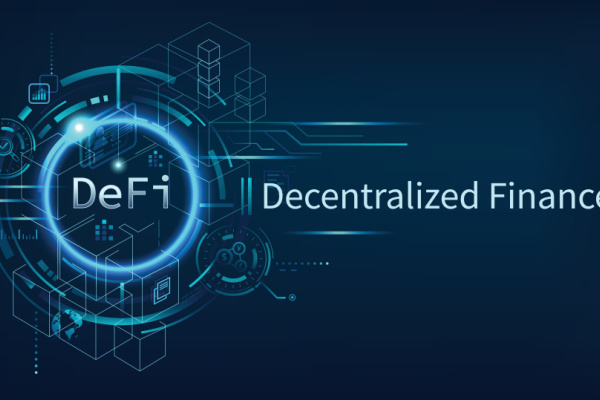In recent years, the world has witnessed a revolutionary change in the financial sector with the emergence of Decentralized Finance (DeFi). DeFi has become a trending topic that is transforming traditional financial practices and reshaping the way we interact with money and assets. This cutting-edge technology is built on blockchain networks, offering users a decentralized, transparent, and borderless financial ecosystem. In this article, we will explore the key components, benefits, and challenges of DeFi, as well as its impact on the finance industry in 2023 and beyond.
-
Understanding DeFi:
DeFi refers to a new wave of financial services and products that are decentralized, open-source, and accessible to anyone with an internet connection. Unlike traditional finance, DeFi eliminates intermediaries like banks and financial institutions, allowing users to maintain control over their assets and data. Smart contracts, automated protocols that execute predefined actions when certain conditions are met, lie at the heart of DeFi platforms, enabling seamless and trustless transactions.
-
DeFi Lending and Borrowing:
One of the most prominent use cases of DeFi is lending and borrowing. DeFi lending platforms allow users to lend their digital assets and earn interest, while borrowers can access loans without the need for a credit check. This peer-to-peer lending model provides greater financial inclusion for individuals who may not have access to traditional banking services, opening up new opportunities for economic growth.
-
Yield Farming and Liquidity Mining:
Yield farming and liquidity mining are popular strategies employed by DeFi users to earn additional rewards. Yield farmers leverage various DeFi protocols to maximize their returns by providing liquidity to different pools. Liquidity mining incentivizes users to contribute funds to DeFi projects by rewarding them with native tokens, encouraging active participation and community growth.
-
Decentralized Exchanges (DEXs):
Traditional centralized exchanges have long been vulnerable to security breaches and regulatory challenges. DeFi has addressed these concerns with the rise of decentralized exchanges (DEXs). DEXs allow users to trade digital assets directly from their wallets without relying on a central authority, enhancing security and privacy while enabling faster transactions.
-
Challenges and Risks:
Despite its rapid growth, DeFi faces several challenges. The technology is relatively new, leading to security vulnerabilities and smart contract exploits that have resulted in significant financial losses for some users. Regulatory uncertainty is another hurdle that DeFi must overcome to ensure its widespread adoption without facing legal repercussions.
-
The Future of DeFi:
As we progress into 2023 and beyond, DeFi is expected to continue its upward trajectory. The growing interest from institutional investors, improved user experience, and ongoing innovation in DeFi protocols are likely to fuel its expansion. Additionally, as blockchain scalability and interoperability solutions evolve, DeFi platforms will become even more efficient and scalable, attracting a more extensive user base.
-
Impact on Traditional Finance:
DeFi’s rise has sparked discussions about its potential to disrupt traditional financial systems. While traditional finance has its merits, DeFi offers greater financial inclusivity, transparency, and accessibility. As the DeFi ecosystem grows, it may influence regulatory frameworks and inspire traditional financial institutions to explore blockchain technology to stay competitive.
Conclusion:
Decentralized Finance is undoubtedly a revolutionary force, reshaping the financial landscape in 2023 and beyond. With its potential to democratize finance and provide greater financial opportunities to individuals worldwide, DeFi represents a significant step towards a more decentralized and inclusive global economy. However, it is crucial to address the challenges and risks associated with this technology to ensure its sustainable growth and long-term success. As DeFi continues to evolve, it will likely play a crucial role in shaping the future of finance.
FAQs
What is Decentralized Finance (DeFi)?
- Decentralized Finance, or DeFi, refers to a set of financial services and products built on blockchain networks that operate without the need for intermediaries like banks or financial institutions. It aims to provide a more open, transparent, and accessible financial ecosystem for users worldwide.
How does DeFi work?
- DeFi platforms utilize smart contracts, which are self-executing code running on blockchain networks, to automate financial transactions and processes. Users interact with these contracts directly through decentralized applications (DApps) to lend, borrow, trade, and participate in various financial activities.
What are the benefits of using DeFi?
- DeFi offers several advantages, including financial inclusivity, as it allows access to financial services for individuals without a traditional bank account. It also enables users to maintain full control over their assets, offers greater transparency in transactions, and often provides higher yields compared to traditional financial products.
Is DeFi safe?
- While DeFi provides enhanced security through blockchain technology, it is not without risks. Smart contract vulnerabilities and hacks have led to significant financial losses for some users in the past. Users should exercise caution, conduct due diligence, and only invest what they can afford to lose.
How do I start using DeFi?
- To start using DeFi, you need a digital wallet and access to a blockchain network like Ethereum, which hosts a majority of DeFi projects. You can then interact with various DeFi platforms through decentralized exchanges (DEXs) or lending protocols by connecting your wallet.
What is Yield Farming and how does it work?
- Yield farming is a strategy used by DeFi users to earn additional rewards by providing liquidity to specific DeFi protocols. Users stake their assets into liquidity pools, earning trading fees and native tokens as incentives for their contributions.
Can I earn interest on my crypto holdings with DeFi?
- Yes, DeFi lending platforms allow users to earn interest on their digital assets by lending them to borrowers. The interest rates are determined by the supply and demand dynamics of each asset in the lending pool.
What are the risks associated with DeFi lending?
- DeFi lending involves counterparty risk, where borrowers may default on their loans. Additionally, users must consider the smart contract risk, as vulnerabilities or exploits could lead to financial losses.
How does DeFi impact traditional finance?
- DeFi’s rise has prompted discussions about its potential to disrupt traditional finance. While traditional finance remains dominant, DeFi’s growth may inspire traditional institutions to explore blockchain technology and adopt certain aspects of DeFi to enhance their offerings.
Is DeFi regulated?
- DeFi operates on decentralized networks, making it challenging to apply traditional regulatory frameworks. The regulatory landscape for DeFi is still evolving, with some countries taking steps to address certain aspects of DeFi activities.
Remember that DeFi is a rapidly evolving field, and it’s essential to stay informed and exercise caution when participating in DeFi protocols. Always do your research and consider the risks before investing or engaging in any DeFi activity.



